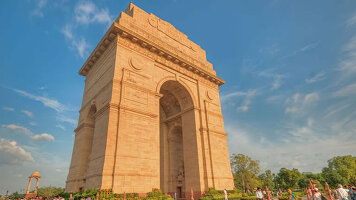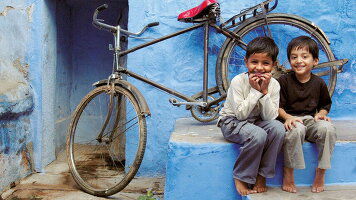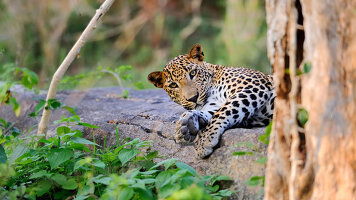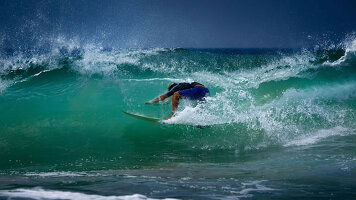Overview
9 Days
Kochi
Kochi
Food & Drink
Comfortable
Affordable
16-99 Years
16
Moderate
Fully Guided
XKB
Itinerary
Our trip starts in Kochi, a port city on India's Malabar Coast. Also known as Cochin, it's been a port since 1341, when it was used by Arab, Chinese and European merchants. Built across several islands with criss-crossing waterways, the city has a cosmopolitan feel and a vibrant food scene amongst the local markets and street food stalls.
There are no planned activities today, so you're free to arrive at any time. Our tour leader will hold a welcome meeting in the hotel reception at 5pm and there'll be the chance to go for dinner afterwards. If you arrive later, they'll catch you up in the morning.
If you'd like a hotel transfer, you'll need to arrive into Cochin International Airport (COK), which is 40km/1.5 hours from the airport.
Our hotel for the next two nights is an art-deco style property located on Willingdon Island, just a short distance from Forty Kochi. The hotel has a choice of excellent in-house restaurants. Stay: Hotel Casino (or similar) (Premium)
Our destination this morning is the Fort Kochi district. We'll take an autorickshaw to Embarkation Jetty, where we'll take the ferry to cross the water over to Mattancherry Palace. Built by the Portuguese in the 16th century. Extensive renovations by the Dutch hundreds of years later earned it the name the Dutch Palace and it's home to some of the best murals in India, depicting scenes from the Ramayan.
From the palace, we'll venture out to explore Fort Kochi further, including the Jewish town synagogue and the famous cantilevered Chinese fishing nets that line the harbour. Delving into Fort Kochi's numerous alleyways and markets, we'll get our first taste of Indian street food, including Masala Vada, a fritter made from chana dal, fennel seeds and peppers, and Bonda, a fried bite-sized snack made from spicy potato and fried in a flour batter.
Continuing our culinary journey, we'll stop at the Tea Bungalow for lunch. Our introduction to Keralan food will be Sadya (which literally translates as banquet), a variety of traditional vegetarian dishes. usually served on a banana leaf. The resident chef will talk us through the origins of our meal before we sample an assortment of freshly prepared dishes.
After lunch, we'll unwind with a cruise around the harbour to take in the sea air and see the expansive waterways that form the beating heart of Kochi. Then, to round off the day, we'll settle in for a traditional Kathakali performance. Combining dance, mime, ballet and opera, Kathakali portrays stories from great Indian epics like Ramayana and Mahabharata. The dance takes years of dedication to master and is characterised by distinct eye movements and facial expressions, enhanced by Stay: Hotel Casino (or similar) (Premium) (B/L)
Today, we'll have an early start to catch culinary Kochi at work. We'll take the public ferry to Ernakulam town, where we'll take a walk through the vegetable market and learn about the exotic fruits, vegetables and spices used in South Indian cooking. We'll also stop by the Shiva temple to see the court complex before heading to a local restaurant for a breakfast dosa making demonstration.
This delicious pancake-style breakfast dish originates from South India. Dosas are generally made from fermented batter consisting of lentils and rice accompanied by aloo masala, potato with onion, turmeric and black mustard seeds or sambar - a soup-like vegetarian dal.
Around mid-morning, we'll say goodbye to Kochi and the Indian Ocean and drive inland to Munnar, around five hours away. En route, we'll stop at a local bakery to try a traditional thali lunch. Thali is traditionally served in small bowls consisting of rice, lentil, dal, and curried vegetables, served with flatbread.
Munnar is known for its verdant spice and tea plantations. Kerala has been renowned for its spices for more than 2000 years and the coast was frequently visited by the Phoenicians, Romans, Arabs and Chinese. 'Black gold' (pepper) became highly valuable and was sent to Europe by Arab and Jewish traders, who, in return, brought copper, brass and gold coins to Kerala. It was this trading link that brought Christianity and Islam to Kerala, making it the first place in India to host both faiths.
Munnar itself is a small town in the Western Ghats Mountain range. Formerly a resort for the British Raj, it's a tranquil place surrounded by green tropical forests and neat tea plantations. This afternoon is free to explore it at your own pace. Stay: Copper Castle Resort (or similar) (Comfortable) (B)
Today, we'll start by visiting a tea plantation, learning all about the growing and leaf picking process. Moving on to the tea museum, we'll learn about how tea leaves become the product we're used to brewing in our morning cuppa.
This afternoon is free to relax at the hotel, you can use the spa or take part in a yoga class. If you feel up to it, you might want to walk through the grasslands and the tea plantations. This circular walk takes around four hours, climbing to an altitude of 2000 metres. Alternatively, the hotel has a limited number of bicycles to hire. Stay: Copper Castle Resort (or similar) (Comfortable) (B)
This morning, we'll descend from the highlands and drive to the teak forests that surround Thekkady and Periyar National Park. We'll take a tour of a spice garden with a resident expert, learning the importance of spices in Indian culture and how spices such as cardamom, pepper, vanilla, nutmeg, ginger, and curry plant thrive in this area of the world. After our tour, we'll have a cooking demonstration, showcasing how spices are carefully blended and used to cook before sitting down to lunch.
Our comfortable hotel tonight is located in Kumily and offers a mix of jungle cottages and rooms amongst the forest. There's also a spa offering Ayurvedic therapies and a swimming pool. Stay: Abad Green Forest (or similar) (Comfortable) (B/L)
Leaving Thekkady, we'll head back towards the coast for our one-night homestay. We'll stay with local families in a small village and your tour leader will brief you on local customs and traditions. This is a great opportunity to learn about the Keralan way of life - and, of course, try some delicious home cooking like spicy coconut curry.
This afternoon, there'll be the chance to take a gentle walk through the surrounding villages where we can learn about toddy tapping. This is the process of collecting fresh sap from palm trees, which is then fermented for five hours to turn it into toddy with 6-7% alcohol content. In the evening, we'll join our host family as they prepare a homecooked meal from recipes passed down through the generations.
Our rooms are in traditional Keralan style. All are twin share and the majority have their own bathroom attached, however some have a private bathroom allocated in the corridor. Bathrooms are basic with a toilet and shower and hot water can be limited at times. Bedding and towels are provided Stay: Simple Homestay (or similar) (Simple) (B/D)
This morning, we'll begin our tour of Kerala's famous backwaters. We'll board a simple, traditional houseboat to begin our journey into the network of waterways.
Taking a relaxed pace, we'll meander past riverside village life, spotting locals tending to animals and cultivating vegetables on narrow spits of land. Watch as we pass gardens flourishing with brightly coloured flowers, sharply contrasting the tropical greenery.
While on board, we'll be treated to a cooking demonstration with the option to cook a fish curry or a vegetarian dish served on a banana leaf.
After our tour through the network of waters, we'll moor up alongside other houseboats for the night. This means we can hook up to an electricity point and turn on the aircon. The houseboats bring us back to basics with simple, en-suite twin rooms - a unique way to spend a night on the famous waters. Stay: Premium Houseboat (or similar) (Premium) (B/L/D)
Waking up to views of rural Kerala, we'll enjoy a relaxed breakfast on board before disembarking mid-morning and returning to Kochi. Arriving in time for lunch, we'll head to a seafood restaurant on the northern tip of Fort Kochi, an ideal spot to watch the boats go by as we sample the freshly caught catch.
The rest of the day is free to enjoy at your own pace. If you wish, your tour leader will be happy to book a table at the highly acclaimed Chef Pillai at Le Meridien - this should be made at the start of the tour to guarantee a table. Stay: Abad Plaza Hotel (or similar) (Premium) (B/L)
Our tour of Kerala ends at our hotel in Kochi.
There are no activities planned today, so you're free to depart at any time. If your flight leaves later in the day, luggage storage facilities are available at our hotel. If you'd like a hotel transfer, you'll need to depart from Cochin International Airport (COK). (B)
Trip Inclusions
- Get a taste for South India on this culinary and cultural journey through beautiful Kerala
- Relax on a traditional houseboat and journey through the famous Kerala backwaters
- Visit spice gardens and sample some of the region's most famous dishes
- Moderate pace tours are ideal if you want a holiday which combines exciting activities and experiences with plenty of time to relax and unwind. Typically you'll be active and busy for part of the day but then also have time to rest and recharge your batteries.
- Accommodation, itinerary and inclusions subject to change.
- Price is for land, cruise and internal flights as specified. Flights not specified are not included
Operator
Our small groups are typically 12 people – small enough to get right into the heart of your destination, but big enough to find like-minded people to share your experiences with. And the glue that holds these groups together is our local tour leaders, who are uniquely placed to add individual and spontaneous moments to each trips – moments that stay with you long after you return home. All sorts of people travel with Explore – our groups are usually a mix of solos, couples and friends. What unites them is their adventurous spirit and thirst for real travel experiences.
We provide authentic small-group travel, designed by experts and led by experts, with sustainability at its heart and a common desire for unforgettable experiences. Whether you’re on a cultural tour of Lebanon, cycling in Vietnam, walking in Italy or exploring Costa Rica with your family, when you’re travelling with Explore you know that you’re in good hands.
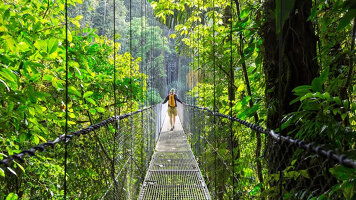
Launching in 1981, Explore Worldwide offer trips from over 130 countries - from classic small group tours. Read more
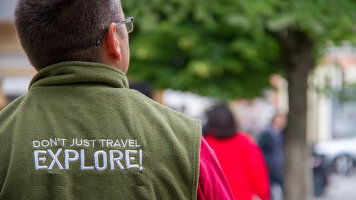
Explore's leaders are more than just your typical guide. They're your local expert are are passionate about sharing their expertise with you. Read more
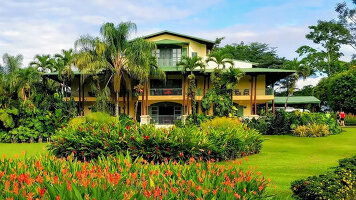
The places Explore stay are every bit as important as the sights they visit and the things you do. Read more
Download Brochure
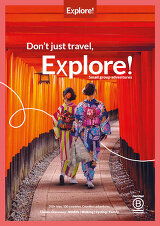
Explore Worldwide Small Group Adventures (2025-26)
Dates & Pricing
 USD
USD
A definite departure means minimum numbers have been reached for this departure to operate. Your Global Journeys Travel Advisor will check the availability of your departure date when you Inquire. Additional savings may apply. T&C’s apply.
Tour & cruises prices are per person. Prices shown have savings applied, are subject to availability and may be withdrawn at any time without notice. Pricing and trip details are correct at this point in time, however are subject to confirmation at the time of booking and are subject to change by Explore. For cruise itineraries, cabin images are sourced from the cruise-line and should be treated as indicative only. Cabin inclusions, upholsteries and room layout may differ to the image(s) shown depending on the ship selected and your sailing dates.





